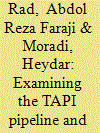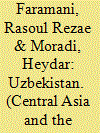|
|
|
Sort Order |
|
|
|
Items / Page
|
|
|
|
|
|
|
| Srl | Item |
| 1 |
ID:
118732


|
|
|
|
|
| Publication |
2012.
|
| Summary/Abstract |
Before 1991, the states of Central Asia were marginal backwaters, republics of the Soviet Union that played neither a major role in the Cold War relations between the U.S.S.R. and the United States, nor in the Soviet Union's relations with the principal regional powers of Turkey, Iran, and China. But in the 1990s, the dissolution of the Soviet Union coincided with rediscovery of the energy resources of the Caspian Sea, attracting a wide range of international oil companies, including American majors, to the region. Eventually, the Caspian Basin became a point of tension in U.S.-Russian relations. In addition, Central Asia emerged as a zone of conflict between the regional and cross-regional powers. The events of 11 September, 2001 and the terrorist groups operating in Afghanistan brought Central Asia to the forefront of U.S. attention. The growing importance of natural gas imports to today's economies is compelling the world community to think anew about energy security.
|
|
|
|
|
|
|
|
|
|
|
|
|
|
|
|
| 2 |
ID:
134135


|
|
|
|
|
| Publication |
2014.
|
| Summary/Abstract |
After the collapse of the Soviet Union, the Central Asian states became independent and tried to pursue their foreign policy free from Russian control. Uzbekistan is the only Central Asian state to pursue a proactive and independent foreign policy. Uzbekistan has higher regional power ambitions than the other Central Asian states.
So what is preventing Uzbekistan from fulfilling its dream? It has the necessary subjective and objective prerequisites for this: military potential, a large and fairly homogeneous population, natural resources, favorable geographic location, U.S. support of its secular state, and the willingness of the latter to recognize its regional hegemony. However, the country continues to face several limitations that hinder its leading role. Despite its capabilities, it is not engaging wholeheartedly in regional integration and is hampered by its geographic location, water shortages, structural economic constraints, political problems, and fundamentalism issues.
|
|
|
|
|
|
|
|
|
|
|
|
|
|
|
|
|
|
|
|
|